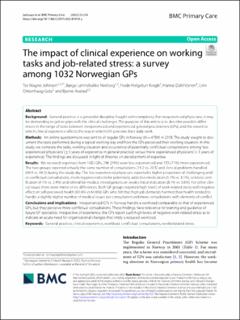| dc.contributor.author | Johnsen, Tor Magne | |
| dc.contributor.author | Norberg, Børge Lønnebakke | |
| dc.contributor.author | Krogh, Frode Helgetun | |
| dc.contributor.author | Vonen, Hanne Dahl | |
| dc.contributor.author | Getz, Linn Okkenhaug | |
| dc.contributor.author | Austad, Bjarne | |
| dc.date.accessioned | 2023-01-31T15:59:49Z | |
| dc.date.available | 2023-01-31T15:59:49Z | |
| dc.date.created | 2022-08-29T13:55:18Z | |
| dc.date.issued | 2022 | |
| dc.identifier.issn | 2731-4553 | |
| dc.identifier.uri | https://hdl.handle.net/11250/3047513 | |
| dc.description.abstract | Background
General practice is a generalist discipline fraught with complexity. For inexperienced physicians, it may be demanding to get to grips with the clinical challenges. The purpose of this article is to describe possible differences in the range of tasks between inexperienced and experienced general practitioners (GPs), and the extent to which clinical experience affects the way in which GPs perceive their daily work.
Methods
An online questionnaire was sent to all regular GPs in Norway (N = 4784) in 2018. The study sought to document the tasks performed during a typical working day and how the GPs perceived their working situation. In this study, we compare the tasks, working situation and occurrence of potentially conflictual consultations among ‘less experienced physicians’ (≤ 5 years of experience in general practice) versus ‘more experienced physicians’ (> 5 years of experience). The findings are discussed in light of theories on development of expertise.
Results
We received responses from 1032 GPs; 296 (29%) were less experienced and 735 (71%) more experienced. The two groups reported virtually the same number of consultations (19.2 vs. 20.5) and clinical problems handled (40.4 vs. 44.2) during the study day. The less experienced physicians reported a higher proportion of challenging and/or conflictual consultations, involving prescriptions for potentially addictive medication (5.7% vs. 3.1%), sickness certification (4.1% vs. 2.4%) and referral for medical investigations on weak clinical indication (8.1% vs. 5.6%). For other clinical issues there were minor or no differences. Both GP groups reported high levels of work-related stress with negative effect on self-perceived health (61.6% vs 64.6%). GPs who felt that high job demands harmed their health tended to handle a slightly higher number of medical issues per consultation and more consultations with elements of conflict.
Conclusions and implications
Inexperienced GPs in Norway handle a workload comparable to that of experienced GPs, but they perceive more conflictual consultations. These findings have relevance for training and guidance of future GP specialists. Irrespective of experience, the GPs report such high levels of negative work-related stress as to indicate an acute need for organisational changes that imply a reduced workload. | en_US |
| dc.language.iso | eng | en_US |
| dc.publisher | BMC | en_US |
| dc.relation.uri | https://bmcprimcare.biomedcentral.com/articles/10.1186/s12875-022-01810-y | |
| dc.rights | Navngivelse 4.0 Internasjonal | * |
| dc.rights.uri | http://creativecommons.org/licenses/by/4.0/deed.no | * |
| dc.title | The impact of clinical experience on working tasks and job-related stress: a survey among 1032 Norwegian GPs | en_US |
| dc.title.alternative | The impact of clinical experience on working tasks and job-related stress: a survey among 1032 Norwegian GPs | en_US |
| dc.type | Peer reviewed | en_US |
| dc.type | Journal article | en_US |
| dc.description.version | publishedVersion | en_US |
| dc.source.volume | 23 | en_US |
| dc.source.journal | BMC Primary Care | en_US |
| dc.source.issue | 1 | en_US |
| dc.identifier.doi | 10.1186/s12875-022-01810-y | |
| dc.identifier.cristin | 2046768 | |
| cristin.ispublished | true | |
| cristin.fulltext | original | |
| cristin.qualitycode | 1 | |

